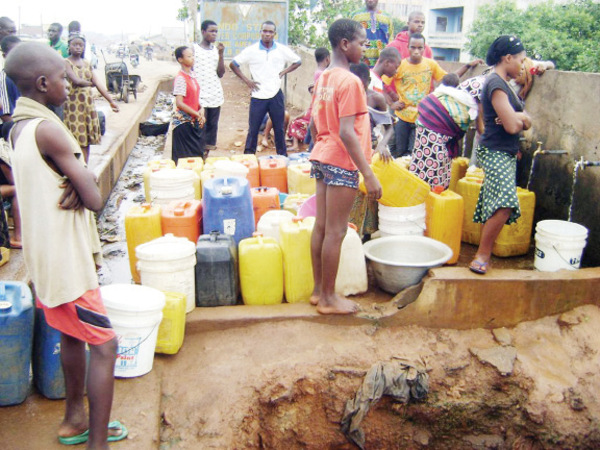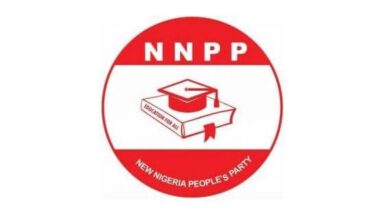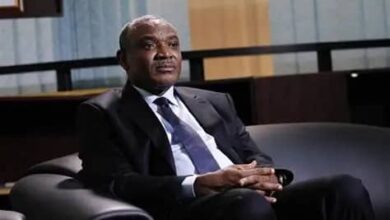Lagos dry taps, testament of corruption and mismanagement, by Seyi Clement 2020

(First published February 5, 2020 by Seyi Clement on his website https://seyiclement.com/lagos-dry-taps-a-testament-to-apc-failure-in-lagos/)
Titled: “Lagos dry taps, testament of corruption and mismanagement”, Seyi Clement wrote:
I was lucky enough to be born in an era of pipe borne water. We had taps situated at the back of our compounds both in Prison Street and Beecroft Street on the Island. We sniggered at those who had to carry their buckets to the Holy Cross Cathedral on Catholic Mission Street to fetch water. We considered ourselves privileged.
In the 70s, we moved to Willoughby Street, Ebute Metta, and we joined the army of water fetchers at the public tap at the junction of Willoughby Street and Griffiths Street.
In the 80s, we moved to Surulere, and we had drinkable pipe borne water everywhere, in the master bedroom, kitchen, bathroom, toilet, garden, etc. So, what happened to Lagos, why have the taps gone dry? Why are Lagosians driven to the primeval existence of relaying on dug wells in one of the richest cities in Africa?
This vital resource has been ineptly managed from 1999 to date, with the resultant increase in infant mortality due to dysentery and cholera (both of which now accounts for over 150,000 deaths in a year), with no hope in sight.
It is accepted that water crisis is not unique to Lagos. What is unique to Lagos is that despite being rich in water resources, despite our economic powers, successive government since 1999 have failed to devise and implement any sustainable and coherent policy and programme to deal with the crisis.
Currently, the Lagos Water Corporation (LSW) is facing a 320-million-gallon water demand gap due to lack of investment, mismanagement, decaying infrastructure, failure in planning and corruption.
Lagos State, with its 180 km long coastline, lagoons, creeks, swamps, an average annual rainfall of 2000mm and wealth, should be better equipped to deal with the crisis with better management and vision. Approximately 40% of Lagos is covered by wetlands and water bodies, so the lack of available drinking water has left Lagosians perplexed and poorer as a result.
Whilst it is acknowledged that population growth has been a major challenge for the State, the main causes of the dry taps is not population growth, but lack of planning, underinvestment, and corruption. From 1910 when the Iju Waterworks was launched, it was clear that with the projected growth in the population of Lagos, new major waterworks or at least significant number of mini waterworks needed to be built every few years to meet the expected growth in demand. As part of this programme, a second water treatment and distribution facility in Ishasi was built by the British.
During the Jakande administration, ten mini waterworks were built located throughout the State. In 1991, the Raji Rasaki administration commissioned the first phase of the construction of the Adiyan Waterworks, the most significant water treatment facility in the West Africa Sub-region. This sadly was the last major development completed in Lagos State in this sector, which is almost criminal given the fact that our population has grown 500% between 1991 and now.
The Lagos water crisis has been a source of bewilderment, as Lagos is a rich small city surrounded by water, yet the taps are dry. The rich are building boreholes, the poor are digging wells, producing undrinkable water filled with parasites and bacteria. Lagosians are making regular procession to hospitals and pharmacies with symptoms associated with waterborne diseases, yet the government is nonchalant.
Poorly funded projects within the Water Corporation have led to stalled infrastructure developments that have rendered the projects non-functional and useless. Currently, less than 10 percent of households in Lagos have access to public water connections and even then, the supply is irregular, highly contaminated and undrinkable.
According to the Lagos State Water Master Plan published in 2011, a total of $2.5 billion is needed to allow the corporation to supply the required access to the Lagos population. The Plan also includes the plan to increase the water production capacity to 745 million gallons per day by the year 2020. The failure to review the Plan since 2011 is not the only crime against Lagosians, or the fact that as at today, LSW is producing only 220 million gallons per day. This is less than 1/3 of what it should have been generating in 2020. The worst crime against Lagosians that with some of the past administrations, no budget was allocated to the LWS for capital projects. By 2050, the Lagos population is expected to reach approximately 50 million and the estimated water supply gap (difference between demand and supply) will exceed 1 trillion gallons per day. What would we be drinking then?
Any incoming administration would need to invest significantly in the water plants, as the proposed expansion of Afiyan, Odomola, Isashi and Otalkosi and the constriction of 2 desalination plants — Yewa and Ibeshe, have grounded to a halt due to inadequate funding. In addition, most of our public pipe network have come to the end of their lifespan and are now considered unsafe, with the potential for harbouring water borne bacteria such as legionella, typhoid, salmonella etc. Lastly, our pipes contain lead, which has been known to cause lead poisoning, and other health issues in children, including deformities, slow development, premature and stillbirths for more than 20 years, but no one is talking about these health issues.
Lagos deserves an administration which is committed to improving our quality of life, which successive government since 1999 have shown themselves eminently incapable of doing.
Seyi Clement
Lawyer, Social Commentator









